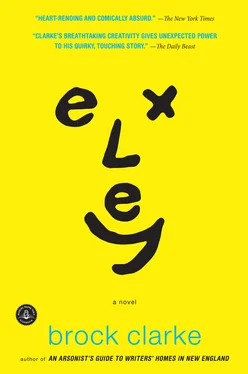The First and Tenth Days
The first day of my teaching my dad’s class, Tuesday, the eleventh of September, 200–, I’d waltzed right into the room like it was my class and had always been my class. I was carrying my backpack. Inside was the syllabus and the first book I wanted them to read: The Blithedale Romance , by Nathaniel Hawthorne. I would have had them read Hawthorne’s The Scarlet Letter , but I’d read them both when I was seven, and it had taken me longer to read The Blithedale Romance , which meant it was a better book. I was going to tell them that on the first day of class. I put my backpack on the table in front of the room, stood behind the little lectern that was also on the table. It wasn’t even half a lectern, and I wasn’t even half a professor: the class could probably see only the top of my hair from where they were sitting. I stepped to the side, but it was too late. They were looking at me. I tried looking back at them, but I couldn’t see any of the students clearly: they were just a blur of faces that said, What the…? I didn’t know what else I could do except take attendance and let them go. I’d done that once a week for six weeks now. The whole thing had been a disaster except for K. K. was the last person to leave the room on the first day, and before she did, I told her that my dad had mentioned her, which was true, and that he had asked me to take good care of her. This was not true. But I figured if I was taking good care of her, then my dad, when he came back, wouldn’t feel like he’d have to, or want to, or should. Anyway, K. and I had never had any problems until she’d kicked me out of her apartment. That had been two days earlier. I wondered if there was something I could do or say to convince her to let me back in.
AFTER LEAVING V.’s father, I walked back home, got my bike, and then pedaled out to the college. I got to the class a minute early, but all seventeen of my students were already there. It was the tenth day of class. Like I said, I’d never really been able to see them clearly; up until now, they’d just been seventeen people who couldn’t believe I was their teacher, maybe because I couldn’t imagine what I would teach them. But now I could see them. Some of them were eighteen years old; some were forty-five. They all had their coats on. They were all still wearing their backpacks. All except for K. K. was sitting in the front row. She had just come from the gym. Her gym bag was on the floor next to her chair. K.’s hair was wet. She was wearing her soft blue fleece jacket. It was zipped up to her chin, and she was chewing on the zipper. K. held a pencil in her right hand; a notebook was open on the desk in front of her. She looked at me expectantly. Everyone else looked at me impatiently. They wanted to get this over with. At my school, teachers always talked about teaching to the test. Well, I had taught to the test. The test was attendance. The question was the students’ names. The answer was, “Here.”
I tossed my backpack and bike helmet onto the table. I cleared my throat. I could see W., whose last name was A., prepare himself to say, “Here.” But I didn’t call his name. I closed my eyes.
“ ‘Between getting smashed and cracking up your hot rods,’” I said, “‘initiating each other into your sex clubs and having your rumbles, you little dears are looking to me for direction.’ ”
I opened my eyes. K. had stopped chewing on her zipper and was smiling at me now with her mouth and with her eyes. No one else was smiling at me, though. Some of them looked like they hadn’t heard a thing. Maybe because the only thing they ever listened for was their name, and their name came later in the alphabet. But A. through L. had heard, all right. They looked at me with hate. That made me happy. They hated me just like Exley’s students had hated him.
“What I just said is from a book,” I said. “Who knows what book?”
K. raised her hand. I smiled and shook my head in what I hoped was a fond way. This was the way you handled the smartest kid in class, who wanted to answer all the questions. This was the way so many teachers had smiled and shook their heads at me. “Does anyone besides K. know what book?” I asked.
No one did. F. glared at me. He was wearing stained work boots. He was in the front row, and I thought I could smell what they were stained with. He stomped one boot, then the other. His son, F. junior, was sitting next to him; his dad looked at F. junior, and he sighed and stomped his boots, too. I guessed they were farmers. I guessed their stomping their boots meant they had work to do. I guessed they wanted me to call attendance already. I ignored them.
“You don’t know the book now,” I said. “But you will.” Then I took the book out of my backpack, and I read. I read the first two chapters, out loud. I didn’t look up when I read. I didn’t want to lose my place and mess up. When I was done, I finally raised my head and looked at the class. Some of them were looking at the clock on the wall, which told me I’d been reading for an hour and a half. But most of them were looking back at me. They didn’t look angry. They looked inspired, although to do what, I don’t think they knew. They also looked confused and beat up, like they didn’t know what had happened to them. They looked like Harold after the second guy who wasn’t Exley had hit him.
“That was from A Fan’s Notes , by Frederick Exley,” I said. “It’s a crime that almost none of you have read this book. But you’re going to. I want you to go buy the book. I want you to read the whole thing, including the two chapters I just read to you, for next week. That’s your assignment.”
“We have an assignment? ” F. asked. He looked tired. There were circles under his eyes. They were lines within the circles. I could tell, by the circles and the lines, how many cows F. had to milk the next morning, every morning. I felt a little bad for him, for all of them. So I finally gave them what they’d been waiting for. I called attendance. I called W.A.’s name. “Here,” he said weakly, and then hauled himself to his feet and shuffled out of the classroom. They all did. Until finally it was just me and K., whose last name was Y. I’d read for so long that her hair was dry by now, and curly. Her fleece jacket was halfway unzipped. Her eyes were wet and shining. She walked up to me, and for a second I thought she was going to kiss me, right there in the classroom, which she’d never done before. She didn’t, but she might as well have. K. was so close to me that her chest was touching mine.
“You sound just like him,” she whispered. She closed her eyes.
“Thank you,” I said. “That’s what V.’s father said, too.”
“I’ve been so lonely,” she said.
“Me, too,” I said. And then: “I bet there are some butterscotch cookies waiting for us back at your place.”
“No,” she said. She opened her eyes and took a step back, so that our chests weren’t touching anymore. “No, no, no, no.” Then she closed her eyes again and moved closer. Her chest touched mine again.
“Why not?” I asked. But K. didn’t answer. She just stood there, her chest against mine, her eyes closed. I closed mine. I wanted to see what she was seeing. But all I saw was what I saw with my eyes open: K. was standing so close to me she was touching me with her chest, but she wouldn’t let me come home with her, and I didn’t know why. I took a step away from her and toward the door. Then I took another and another and another. K. didn’t seem to notice. When I left the classroom, she was still standing there with her eyes closed.
Doctor’s Notes (Entry 17)
The end of the day, and I’m so fatigued I can barely focus on my final patient. The only thing I can focus on is M.’s mother: the memory of her voice on the phone, the promise of seeing her in person two days hence. And when I “take a break” from focusing on M.’s mother, I focus on M. It is fifteen minutes before six. On Tuesdays at six, M. teaches his father’s literature class at Jefferson County Community College (JCCC, in the native tongue). Or so he claims. I had always assumed this was merely another fantasy of his: because after all, what college allows a nine-year-old boy to instruct its students? But then again, he also claims that K. is one of his students, just as she’d been one of his father’s students. And then I remember M.’s mother’s reaction to my saying K.’s name — “No. Shit.” That reaction wasn’t to a fantasy. That reaction seemed real enough.
Читать дальше












